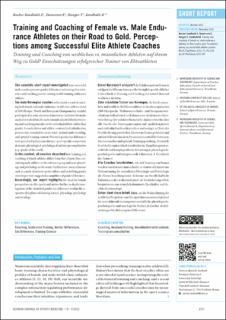| dc.contributor.author | Bucher Sandbakk, Silvana | |
| dc.contributor.author | Tønnessen, Espen | |
| dc.contributor.author | Sandbakk, Øyvind | |
| dc.contributor.author | Haugen, Thomas | |
| dc.date.accessioned | 2023-03-01T08:16:32Z | |
| dc.date.available | 2023-03-01T08:16:32Z | |
| dc.date.created | 2022-12-01T13:14:54Z | |
| dc.date.issued | 2022 | |
| dc.identifier.citation | Deutsche Zeitschrift für Sportmedizin. 2022, 73 (7), 251-258. | en_US |
| dc.identifier.issn | 0344-5925 | |
| dc.identifier.uri | https://hdl.handle.net/11250/3054835 | |
| dc.description.abstract | This scientific short report investigated how successful male coaches perceive gender differences in training characteristics and coaching practice among medal-winning endurance athletes.
Ten male Norwegian coaches with a track record of coaching both female and male endurance world-class athletes (total of 269 Olympic, World and European Championship medals) participated in semi-structured interviews. Inductive thematic analysis revealed that all coaches mainly adjusted their key training and coaching principles to the individual athlete, rather than gender. A coach-driven and athlete-centered individualization process was essential to create trust, mutual understanding, and optimal training content. Potential gender/sex differences were perceived in four main themes: sport-specific competition demands, physiological, psychological and interpersonal factors (e.g., gender of the coach).
In this context, all coaches described how training and coaching of female athletes differs from that of men, thus considering male athletes as the reference group and male physiology and psychology as the norm. Furthermore, societal factors such as a male-dominant sports culture and underlying gender stereotypes were suggested as amplifiers of gender differences.
Accordingly, our report highlights the need for female perspectives in elite sports and invites further in-depth investigations of the identified gender/sex differences within the respective disciplines of training science, physiology, psychology and sociology. | en_US |
| dc.language.iso | eng | en_US |
| dc.rights | Navngivelse-Ikkekommersiell-DelPåSammeVilkår 4.0 Internasjonal | * |
| dc.rights.uri | http://creativecommons.org/licenses/by-nc-sa/4.0/deed.no | * |
| dc.subject | coaching | en_US |
| dc.subject | endurance training | en_US |
| dc.subject | sex differences | en_US |
| dc.subject | gender differences | en_US |
| dc.subject | kjønnsforskjeller | en_US |
| dc.subject | utholdenhetstrening | en_US |
| dc.title | Training and Coaching of Female vs. Male Endurance Athletes on their Road to Gold. Perceptions among Successful Elite Athlete Coaches | en_US |
| dc.title.alternative | Training and Coaching of Female vs. Male Endurance Athletes on their Road to Gold. Perceptions among Successful Elite Athlete Coaches | en_US |
| dc.title.alternative | Training und Coaching von weiblichen vs. männlichen Athleten auf ihrem Weg zu Gold? Einschätzungen erfolgreicher Trainer von Eliteathleten | en_US |
| dc.type | Peer reviewed | en_US |
| dc.type | Journal article | en_US |
| dc.description.version | publishedVersion | en_US |
| dc.source.pagenumber | 251-258 | en_US |
| dc.source.volume | 73 | en_US |
| dc.source.journal | Deutsche Zeitschrift für Sportmedizin | en_US |
| dc.source.issue | 7 | en_US |
| dc.identifier.doi | 10.5960/dzsm.2022.549 | |
| dc.identifier.cristin | 2087046 | |
| cristin.ispublished | true | |
| cristin.fulltext | original | |
| cristin.qualitycode | 1 | |

